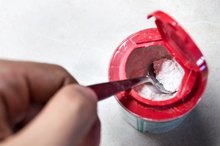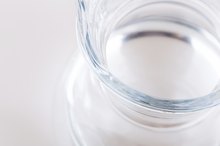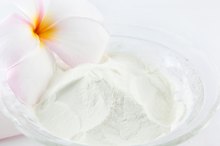What Are Everyday Uses for Buffers?
In layman's terms, a "buffer" is a solution which combines an acid or base and another base or acid which corresponds to it, a mixture which then balances and moderates the pH -- the relative acidity or alkalinity -- of any second solution to which you add it. Buffer solutions have a wide array of uses, not only within chemistry and biology labs, but in everyday life as well.
In the Body
Perhaps their most pertinent everyday application, buffers are never in short supply within the human body 1. A buffer of carbonic acid (H2CO3) and hydrogen carbonate (HCO3-), for example, work in unison to keep the pH of the bloodstream at a neutral 7.4. Another example of buffers within the human body is the "hemoglobin" complex, which binds to excess protons (in other words, hydrogen ions) muscles release during exercise so that the body can use the oxygen they produce alongside the hydrogen.
Commercial Products
How to Restore the pH of Your Scalp
Learn More
Buffers are also important in certain commercial household products. Shampoo, for example, contains buffers of citric acid and sodium hydroxide, which work to balance out the natural alkalinity of soap, which would otherwise burn the scalp. If you have a baby, you've probably noticed that applying baby lotion to his rash relieves it rather quickly. This is because baby lotion is buffered to a slightly acidic pH of six, which inhibits the growth of bacteria and other pathogens.
- Buffers are also important in certain commercial household products.
- This is because baby lotion is buffered to a slightly acidic pH of six, which inhibits the growth of bacteria and other pathogens.
Alcohol Production
Buffers don't just aid in aspects of everyday life that are good for the health, however. Central to alcohol production is a process called "fermentation," wherein sugars convert to alcohol in the absence of oxygen. Unregulated, this process could result in spoilage of the material being fermented, so beer, wine and liquor manufacturers often add buffers to their mixes, which regulate their pH levels such that this isn't possible.
- Buffers don't just aid in aspects of everyday life that are good for the health, however.
- Unregulated, this process could result in spoilage of the material being fermented, so beer, wine and liquor manufacturers often add buffers to their mixes, which regulate their pH levels such that this isn't possible.
Related Articles
References
Writer Bio
Robert Schrader is a writer, photographer, world traveler and creator of the award-winning blog Leave Your Daily Hell. When he's not out globetrotting, you can find him in beautiful Austin, TX, where he lives with his partner.









